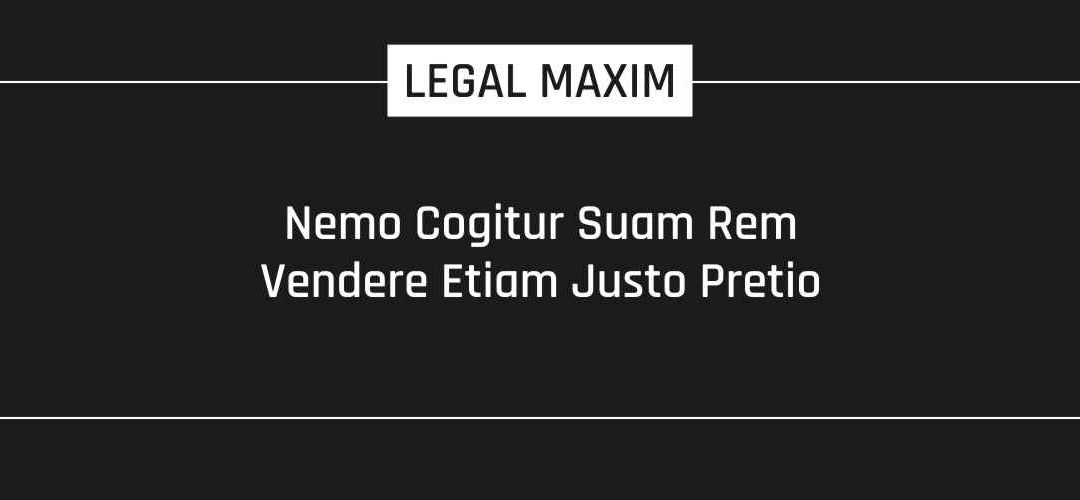Literal meaning
No one is bound to sell his own property, even for a just price.
Origin
Latin
Explanation
This legal maxim lays emphasis on the simple fact that no one can be forced or bound to sell his property, without his free consent to do so. It is a well-established principle under the law that free consent is a vital element in the creation of a valid contract, failing which the contract so made will be Void Ab Initio. In order to create a legal relationship or establish a legally enforceable contract, it is important that both parties to the contract willingly, by their own supreme will agree to the contents (terms and conditions) of the contract. The principle of free consent is ensured by the underlying principle of another important legal maxim – Consensus Ad Idem; which means that the parties to contract to ascertain their free consent to the same thing (or meeting of minds). The definition of contracts under Section 10 of the Indian Contract Act 1872, which reads as: “All agreements are contracts if they are made by the free consent of the parties competent to contract, for a lawful consideration and with a lawful object and are not expressly declared to be void”. The definition itself is a clear indicator of the fact that any agreement that is not made by the free consent of the contracting parties, is not a valid contract.
The principle of free and fair consent occupies a special place under the Indian Contract Law 1872; which can be observed under sections 13 and 14 of the Act.
Section 13 of the Indian Contract Act defines ‘Consent’ in the following manner – “Two or more a person are said to consent when they agree upon the same thing in the same sense.”
Further, Section 14 of the Indian Contract Act provides states following regard to ‘Free Consent’– “Consent is said to be free when it is not caused by –
- Coercion, as defined in section 15, or
- Undue influence, as defined in section 16, or
- Fraud, as defined in section 17, or
- Misrepresentation, as defined in section 18, or
- Mistake, subject to the provisions of sections 20, 21, and 22.
After reading these provisions, it can be said that, for a contract relating to the sale of one’s property also falls under the ambit of contracts and shall be guided by free consent in order to be legally enforceable.
It is a well-understood fact that forced consent to create a contract undermines the very objective of the free and fair practice of law. Anything that is against the free and supreme will of a person, frustrates the foundation of the contract itself and can be challenged at any time. It is pertinent to note that, sale of one’s property is a right in personem (personal right) and cannot be forcefully exercised. The maxim clearly talks about the protection of one’s personal as well as proprietary interests and says that no one can be compelled to sell his or her property unless they wish to do it by their own supreme will and that is what marks the importance of law and order in a society. The principle construed under the maxim states that ensuring security is not limited to the safety of physical beings but also extends to protecting one’s proprietary interests.
The term ‘property’ under the meaning of this section shall not just include movable or immovable assets, but shall also encompass intellectual property rights. Hence, it can be deduced that the creation of third-party interest in one’s property without one’s free consent is against the principles of law and render the contract void and shall also make the perpetrator liable for punishment.
It is important to note that, consent is placed at a higher pedestal than the consideration; which is clear from the maxim that, although, one is entitled to a fair and just consideration for the property possessed, still, one cannot be forced to enter into a contract that is not by free consent. And hence, it is consent and consideration together, along-with other requisites that make a valid contract. Absence of any essential condition that creates a legally enforceable contract would pose a question to the validity of the contract and hence, its execution cannot be enforced under the law. Free consent occupies a vital place in the creation of a legal relationship and its absence can render the whole contract null. Consent is placed at a higher pedestal than consideration since a will is superior to monetary assets and material things.
Illustration
‘A’ forcefully entered into a contract with ‘B’ at the gunpoint. The contract was for the sale of all properties that belonged to ‘B’, for a just and fair consideration, to ‘A’. Afterward, when ‘B’ was asked to validate the contract before the Magistrate, ‘B’ expressly refuted that his free will existed during the contract. Ultimately, the contract was held void-ab-initio and its execution was not enforceable under law.
Case laws
In Chikam Amiraju vs. Chickam Seshamma (1912) 16 IC 344, the petitioner entered into a contract with the respondent against his free will, under threat of suicide by the respondent, which amounts to coercion; hence frustrates the purpose of the contract and was held void. Although, the consideration offered was fair, but the absence of free will distort the creation of a valid contract, and the maxim (Nemo Cogitur Suam Rem Vendere Etiam Justo Pretio) was upheld.
This Maxim has been written and submitted by Ms. Mansi Batra during her course of internship at B&B Associates LLP. Ms. Mansi is a third-year law student at the Fairfield Institute of Management and Technology, Kapashera, New Delhi.
